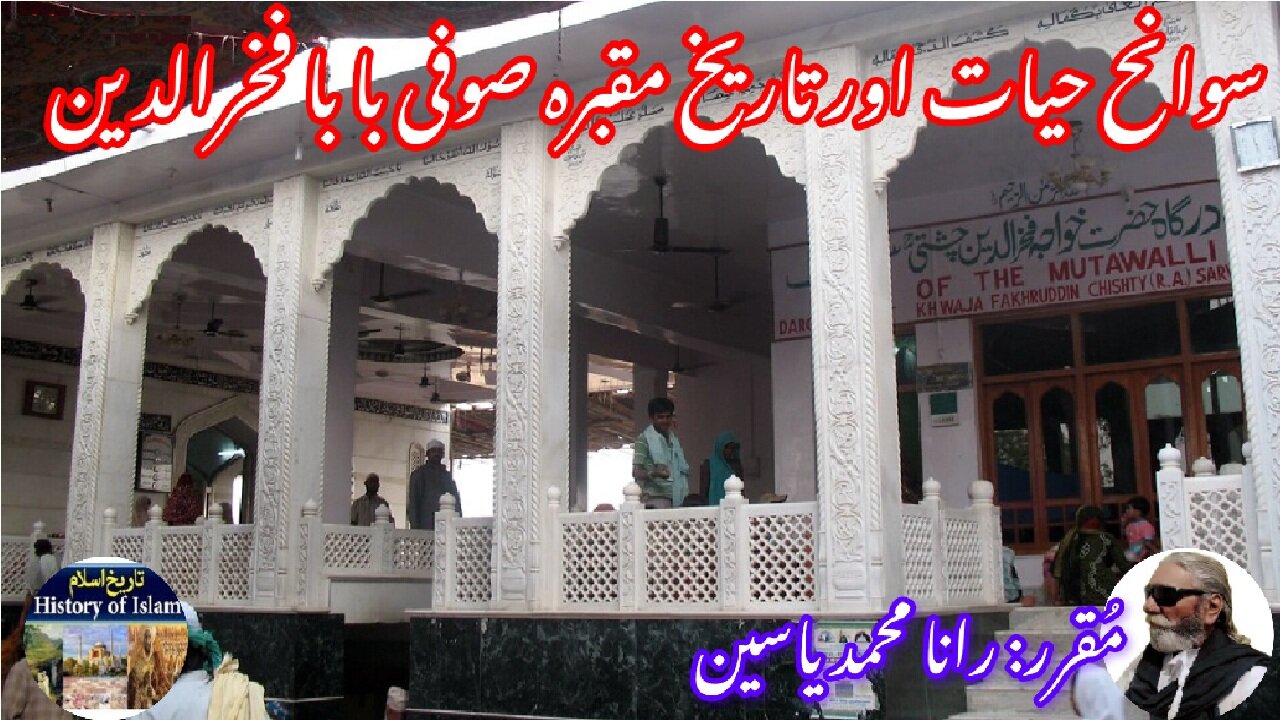Premium Only Content

Biography and Tomb of Baba Fakruddin बाबा फकरुद्दीन سوانح حیات اور مقبرہ بابا فخر الدین
@islamichistory813 #sufisaint #culturalheritage #islamicmysticism #islamicphilosophy #shrine #historicalfigures
#babafakruddin
Biography of Baba Fakruddin
Baba Fakruddin, a prominent Islamic scholar and Sufi mystic, was born in the year 1169 CE (564 AH) in the region of what is now modern-day India. Although specific details about his birthplace are not universally agreed upon, it is widely believed that he was born in a town in the Deccan plateau. This area was a melting pot of cultures and religions, where diverse traditions converged, creating a rich environment for intellectual and spiritual exploration. The socio-political landscape of the time was heavily influenced by the burgeoning presence of Muslim dynasties, including the Delhi Sultanate, which facilitated the spread of Islamic thought and culture across the Indian subcontinent.
Fakruddin's early life was characterized by a deep spiritual inclination and a thirst for knowledge. He was born into a family known for its piety and scholarship, which provided a nurturing environment for his intellectual pursuits. From a young age, he displayed a keen interest in religious studies, particularly in the teachings of the Quran and the Hadith. His parents encouraged his education, and he was exposed to various Islamic scholars who visited their home, further igniting his passion for learning.
Fakruddin's formal education began at a local madrassa, where he immersed himself in the foundational texts of Islam. His initial studies included the Quran, the teachings of the Prophet Muhammad, and Islamic jurisprudence. As he progressed, he sought knowledge from various renowned scholars of his time, traveling to major centers of Islamic learning in the region. His thirst for knowledge led him to study under various Sufi masters, who profoundly influenced his spiritual development.
During his educational journey, Fakruddin developed a particular affinity for Sufism, the mystical dimension of Islam. He was drawn to the teachings that emphasized inner purification, love, and devotion to God. His interactions with Sufi scholars instilled in him the principles of self-discipline, humility, and the quest for divine love. This path would shape his future as a spiritual leader and guide.
Fakruddin's studies extended beyond Sufism and Islamic theology. He delved into philosophy, literature, and the various cultural practices of the regions he visited. His comprehensive education equipped him with a profound understanding of the human condition and the complexities of spirituality. He became well-versed in Arabic and Persian literature, which further enriched his intellectual and spiritual insights.
Baba Fakruddin emerged as a prominent figure in Sufism, gaining recognition for his wisdom, compassion, and deep understanding of Islamic spirituality. His teachings emphasized the importance of a personal relationship with God, urging his followers to seek divine love and guidance through inner reflection and spiritual practice. He became a pivotal figure in the spread of Sufi teachings in southern India, particularly in the Deccan region.
Fakruddin founded a Sufi lodge (kh?nq?h) in Penukonda, where he taught and mentored countless disciples. His kh?nq?h became a center for spiritual learning, attracting seekers from diverse backgrounds who were eager to learn from his wisdom. He encouraged his followers to engage in acts of service, charity, and community building, highlighting the importance of compassion and humility in the spiritual journey.
One of the hallmarks of Fakruddin's teachings was his emphasis on the unity of existence. He taught that all creation is interconnected and that the path to God involves recognizing this fundamental unity. This perspective resonated deeply with his followers, inspiring them to cultivate love and compassion not only for fellow humans but for all living beings.
Fakruddin was also known for his poetic expressions, which beautifully articulated the depths of his spiritual insights. His poetry often explored themes of divine love, the human soul's longing for God, and the transformative power of spiritual practice. His verses were not only a source of inspiration for his followers but also contributed to the rich tradition of Sufi literature in the Indian subcontinent.
Baba Fakruddin passed away in 1295 CE (694 AH) in Penukonda, where he had spent much of his life teaching and guiding his disciples. His death marked a significant moment in the history of Sufism in the region, as he left behind a profound legacy that would continue to inspire future generations. The news of his passing was met with deep sorrow among his followers, who revered him as a saintly figure and spiritual guide.
Following his death, a shrine was built in Penukonda to honor his memory. This shrine, known as the Dargah of Baba Fakruddin, has become a significant pilgrimage site for Sufi practitioners and admirers of his teachings. The shrine is adorned with intricate carvings, beautiful calligraphy, and floral decorations, reflecting the deep reverence that his followers have for him.
The construction of the shrine was undertaken by his disciples and followers, who sought to preserve his teachings and legacy. It serves as a place of remembrance and spiritual reflection, where visitors come to seek blessings and connect with the spirit of Baba Fakruddin. The shrine has also become a center for spiritual gatherings, commemorative events, and rituals that honor his teachings.
Baba Fakruddin's influence extends beyond his spiritual teachings; he played a vital role in fostering cultural harmony in a diverse and often fragmented society. His approach to Sufism transcended ethnic, cultural, and religious boundaries, emphasizing universal values such as love, compassion, and understanding. This inclusivity resonated with many, fostering a sense of unity among his followers and contributing to the rich tapestry of India's spiritual heritage.
His legacy is evident in various aspects of cultural life, including poetry, music, and art. The teachings of Baba Fakruddin inspired many artists and musicians, who sought to express the essence of Sufism through their art. The celebration of his legacy is reflected in the annual gatherings at his shrine, where devotional songs and poetry are recited, creating an atmosphere of spiritual ecstasy and communal harmony.
The teachings of Baba Fakruddin continue to resonate with contemporary spiritual seekers, reminding them of the timeless principles of love, humility, and devotion that lie at the heart of Sufism. His emphasis on inner transformation and personal experience remains relevant in today's world, encouraging individuals to embark on their own spiritual journeys and seek a deeper connection with the Divine.
Baba Fakruddin's life and teachings represent a rich legacy within the Sufi tradition and Islamic scholarship. His commitment to love, compassion, and inner transformation continues to inspire seekers of truth and spiritual wisdom. The shrine dedicated to him in Penukonda stands as a testament to his enduring influence, attracting visitors who seek inspiration and guidance from his teachings.
Through his writings, teachings, and the community he fostered, Baba Fakruddin continues to inspire generations, reminding us of the power of compassion and the importance of nurturing the inner self on the path to spiritual enlightenment. As a significant figure in the Sufi tradition, Baba Fakruddin's contributions will forever remain a cherished part of the Islamic heritage in the Indian subcontinent and beyond. His legacy serves as a guiding light for those on the spiritual path, encouraging them to cultivate a sincere relationship with the Divine and to embody the values of compassion and understanding in their lives.
=========================
-
 7:40
7:40
ISLAMIC HISTORY
14 hours agoSultan Mehmud Ghazanvi Episode-74 Promises of the Raja of Kannauj قنوج کے راجہ کے قول وعہد
1 -
 LIVE
LIVE
Keepslidin
32 minutes ago$20K BONUS HUNT | ROAD TO 100K | Mother.land
39 watching -
 8:32
8:32
Colion Noir
8 hours agoCaught on Camera: Armed Florida Home Owner Uses Shotgun Against Burglar
6.62K6 -
 LIVE
LIVE
RamrodJenkins
1 hour agoWhat is South of Midnight? It looks awesome! Almost at 400 followers!
99 watching -
 LIVE
LIVE
2 MIKES LIVE
4 hours ago2 MIKES LIVE #204 Open Mike Friday!
198 watching -
 LIVE
LIVE
Midnight In The Mountains
3 hours ago🔴🎮Gaming w/ PER·SE·VER·ANCE LIVE: Samurai Shenanigans & Spartan Struggles 🗡 🚀
47 watching -
 54:04
54:04
LFA TV
8 hours agoTrump Gives Israel the Obama Treatment | TRUMPET DAILY 4.11.25 7PM
4.8K6 -
 1:13:38
1:13:38
Kim Iversen
5 hours agoYou're Being Lied To — Even by 'Independent' Media | Will John
90.1K55 -
 1:39:52
1:39:52
vivafrei
9 hours agoMeth Labs Busts in Canada! More Chinese Election Interference? Cross-Fire Hurricane Scandal & MORE!
105K52 -
 LIVE
LIVE
Dr Disrespect
8 hours ago🔴LIVE - DR DISRESPECT - WARZONE VERDANSK - SOLO WINS
2,014 watching